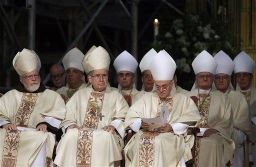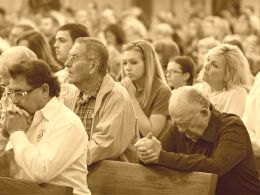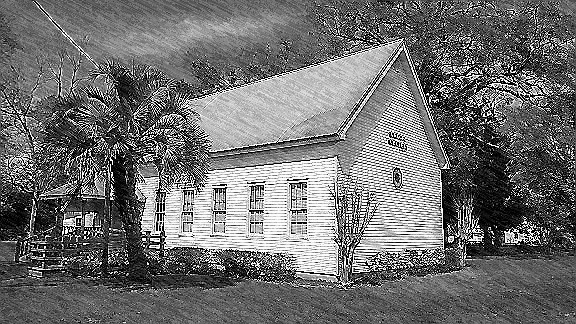We know that it was quite customary for the Jews to “assemble” themselves together on the Sabbath day in their “synagogues.” In fact, there are numerous occasions when the LORD JESUS was at these gatherings. (see Mat.12:9; 13:54; Mark 1:21; 3:1; 6:2; Luke 4:16; John 6:59.) We also see the same thing in the book of Acts as Paul met with the Jews, there, and taught and reasoned from the scriptures. (see Acts 13:14, 42; 14:1; 17:1,10,17; 18:4)
The practice of the Jews in gathering together in these “synagogues” is thought by some to have begun during the Babylonian exile when there was no temple available and they had a desire to come together and be instructed in the Law. No one is absolutely certain when the practice began but it is clear that it was widespread by the time of the arrival of the LORD JESUS CHRIST as each city had at least one such gathering place. This practice continues to this day in one form or other among many Jews.
The Greek word which is translated (or in this case, trans-literated) “synagogue” is “sunagoge”. (pronounced soon-ag-o-gay’) This particular word is found fifty-seven times in the NT and means, “a bringing together, an assembly, or a gathering”. In Acts 13:43 this same Greek word is translated as “congregation”, and in James 2:2 as “assembly”. While a synagogue is an assembly itself, over time the word became associated with the actual buildings which were sometimes constructed for this purpose (see Luke 7:5), in much the same way as the word “church” has become synonymous, (unfortunately) in the minds of most, with a building of brick, wood, or stone and less emphasis is placed on what the “church” (or assembly) and its purpose is.
There are many similarities between the practices of the Jews in their synagogues and those of the followers of CHRIST in early NT “churches”. Yet it is quite interesting that the writer of Hebrews uses a different word to describe the “assembling of ourselves together” in reference to the NT church. The Greek word used here in this text (10:25) is “episunagoge” and literally means “a complete collection”. I believe this has reference to the fact that the assembly of the saints does not lack anything which is not provided by CHRIST. “And hath put all things under his feet, and gave him to be the head over all things to the church, Which is his body, the fullness of him that filleth all in all.” (Eph 1:22-23)
While the Jewish synagogues were, primarily, gatherings of Jews, the “epi-synagogues” knew no nationality. “Where there is neither Greek nor Jew, circumcision nor uncircumcision, Barbarian, Scythian, bond nor free: but Christ is all, and in all.” (Col 3:11) They were not meant for a few select individual believers who met certain doctrinal criteria but for all those who were the followers of CHRIST desiring fellowship with HIM and HIS people. It is a strange twist indeed to see the fragmentation of that body in the present time as various sects and parties have arisen here and there, (as prophesied by Paul, see Acts 20:28-31) each with various means of exclusion for non-conformity to their doctrines more so than their conduct. Each one generally claims to be the “true” church disdaining all others who do not endorse their own shibboleths.
So while it is true that most of the earliest Christians were Jews, the NT church is not just a continuation of the “synagogue” with a different doctrinal bent, but is altogether a different “assembly” which assembles for a completely different reason than mere instruction. A failure to understand and emphasize this distinction distorts the purpose and importance of this “assembling” and gives rise to all sorts of human reasonings which minimize its value.
Instruction in righteousness, most especially the preaching of CHRIST and HIM crucified, should not ever be, minimized, taken lightly, nor in any other wise neglected. Yet the purpose for the assembling of the saints in the NT is not primarily one of instruction. Jeremiah’s prophecy concerning the new covenant sets forth the source of the NT saint’s instruction and demonstrates a shift in the function of the Christian assembly relative to that of the assemblies of the Jews. “But this shall be the covenant that I will make with the house of Israel; After those days, saith the LORD, I will put my law in their inward parts, and write it in their hearts; and will be their God, and they shall be my people. And they shall teach no more every man his neighbor, and every man his brother, saying, Know the LORD: for they shall all know me, from the least of them unto the greatest of them, saith the LORD: for I will forgive their iniquity, and I will remember their sin no more.” (Jer 31:33-34)
Instruction in the NT is considerably different than that of the OT. The old has its basis in the Law and is predicated on the concept of teachers and students, or priests and those ministered to. Yet we find in the NT a different sort of approach to “instruction” and most certainly a different concept of the relationship of those who assemble together, regardless of the types of gifts they have been given. “And they sung a new song, saying, Thou art worthy to take the book, and to open the seals thereof: for thou wast slain, and hast redeemed us to God by thy blood out of every kindred, and tongue, and people, and nation; And hast made us unto our God kings and priests: and we shall reign on the earth.” (Rev 5:9-10)
All spiritual gifts and callings are bestowed for the benefit of the whole assembly and are not a means of exalting one member above another or in any wise bestowing a preeminence thereby. Peter plainly put this concept forth when he admonished those who were called to serve the assembly as “elders”. “The elders which are among you I exhort, who am also an elder, and a witness of the sufferings of Christ, and also a partaker of the glory that shall be revealed: Feed the flock of God which is among you, taking the oversight thereof, not by constraint, but willingly; not for filthy lucre, but of a ready mind; Neither as being lords over God's heritage, but being examples to the flock.” (1Pet 5:1-3) The greatest influence of NT teachers is not in their words but in their deeds regardless of their eloquence. (see John 13:15, 35; Phil.3:17; II Thes.3:9; I Tim.4:12; I Pet.2:21; I Cor. 4:20; I Thes.1:5)
In the NT the saints come together, not primarily to be ministered to, but rather to minister to one another. Paul describes this in Ephesians. “And he gave some, apostles; and some, prophets; and some, evangelists; and some, pastors and teachers; For the perfecting of the saints, for the work of the ministry, for the edifying of the body of Christ: Till we all come in the unity of the faith, and of the knowledge of the Son of God, unto a perfect man, unto the measure of the stature of the fullness of Christ: That we henceforth be no more children, tossed to and fro, and carried about with every wind of doctrine, by the sleight of men, and cunning craftiness, whereby they lie in wait to deceive; But speaking the truth in love, may grow up into him in all things, which is the head, even Christ: From whom the whole body fitly joined together and compacted by that which every joint supplieth, according to the effectual working in the measure of every part, maketh increase of the body unto the edifying of itself in love.” (Eph 4:11-16)

Those who lean towards the OT concept of the “assembly” generally interpret this passage as one which indicates that “ministry” is vouchsafed into the hands of a few who are given various abilities of oratory and scholarship. They see the role of these “instructors” as being that which is central to the operation of the assembly and the primary (if not exclusive) source of ministry therein and is, in essence, a reprisal of the OT priesthood. They commonly view the role of “pastor” as being one of general dominion over most aspects of that assembly, even though they would, in many cases, believe (ostensibly) in “congregational” government.
There is no doubt that GOD has given various “instructional” gifts to some, which is what Paul refers to as being “apt to teach”. There is no doubt that the exercise of these gifts is very beneficial to the assembly. These gifts should not be “neglected” (unused) according to Paul’s instruction to Timothy. (see I Tim.4:13-16) Yet it is not in keeping with the concept of a NT assembly to limit or suppose that “ministry” is exclusive to the exercise of these particular gifts by these particular individuals. The rise of the “clergy system” (which I believe to be the doctrine of the Nicolaitanes and is demonstrated by Diotrephes) is nothing more than a reversion to the law principles that were manifest in the “synagogues” of the Jews.
The clergy system is supported by the notion that there are certain individuals who fall into a particular class or order into whose hands the “ministry” is exclusively placed. They are thereby set apart from the “ordinary” Christian and enjoy a special status wherever they may go. This system is most clearly promoted in the practice of those who have special schools which these “teachers” and “leaders” are required to attend to prepare them for this occupation and then elaborate religious rituals in order to ordain them unto this “work”. Yet others promote the same system to varying degrees when they establish hierarchies in the assemblies of GOD’s people or treat those with teaching gifts with special status.
These “clergymen” are usually given various titles in order to distinguish them from the rank and file to which they are supposed to exclusively “minister”. These titles include, Father, Reverend, Elder, Bishop, Pastor, etc. but are limited only by the imaginations of those who promote this concept. Generally if one of these “clergymen” is recognized by a particular assembly to hold this “position” then there is a transference of this “status” wherever the individual may go. While we are confident that there are offices of service to which some are called in the assembly, we are equally confident that these offices confer no “titles”.
Paul’s instruction to the Ephesians indicates that the teaching gifts are for the purpose of furnishing and equipping the saints in order that they in turn might minister to one another with the various gifts given to each member of the assembly. “And there are diversities of operations, but it is the same God which worketh all in all. But the manifestation of the Spirit is given to every manto profit withal.” (1Cor 12:6-7) The Literal Translation (LITV) renders Eph. 4:12 as “with a view to the perfecting of the saints for the work of the ministry, for the building up of the body of Christ.”
The body of CHRIST is built up by the mutual interdependence of the various parts of that body with each relying on the other in order that the body might be whole. This is the ministry of the saints to which each is called and equipped according to the purpose of GOD. “But now hath God set the members every one of them in the body, as it hath pleased him. And if they were all one member, where were the body? But now are they many members, yet but one body. And the eye cannot say unto the hand, I have no need of thee: nor again the head to the feet, I have no need of you. Nay, much more those members of the body, which seem to be more feeble, are necessary.” (1Cor 12:18-22)
The NT assembly is predicated upon these principles and a disregard of those principles is likely to pervert the NT concept of the assembly in the minds of those who gather there, in many cases causing them to revert to the law principles by which the Jewish synagogues operate. This perversion of purpose and practice, in many cases, makes the assembly an afterthought in the minds of many and a gathering which is optional to varying degrees according to the a variety of whims that one’s flesh may devise as being of greater priority than that assembling. If a man considers his absence from that assembly as just missing a sermon then it’s not really that big of a deal since in this modern age, he can probably listen to it by recording or at least catch one of similar type on TV, radio, or Sermons Online. Yet that which the writer of Hebrews exhorts the sons of GOD not to forsake (i.e.; neglect; leave behind; or desert) is of much greater import than the simple hearing of a preacher’s sermon or Bible lesson, however eloquent or bathed in spiritual platitudes it may be.
The LORD is pleased to dwell in the midst of HIS people, and this is demonstrated in a special way whenever they are assembled together, as contrasted to their walk apart from that assembly. “For where two or three are gathered together in my name, there am I in the midst of them.” (Mat 18:20) The assembly of the saints is a manifestation of the body of CHRIST in a specific location and to neglect or forsake that assembly is, in essence, to forsake the body of CHRIST. To forsake that assembling is to show a callous disregard for the spiritual benefit of those brethren to whom we are each called to minister to and encourage in the most holy faith. It also demonstrates a certain disrespect to the value of the “preached word” which may occur in that assembly.
The LORD is often pleased to deliver HIS teaching to the assembly in a “power” that cannot be captured by simply listening to the same teaching by other means than being present in that assembly. “And I, brethren, when I came to you, came not with excellency of speech or of wisdom, declaring unto you the testimony of God. For I determined not to know any thing among you, save Jesus Christ, and him crucified. And I was with you in weakness, and in fear, and in much trembling. And my speech and my preaching was not with enticing words of man's wisdom, but in demonstration of the Spirit and of power: That your faith should not stand in the wisdom of men, but in the power of God. Howbeit we speak wisdom among them that are perfect: yet not the wisdom of this world, nor of the princes of this world, that come to naught: But we speak the wisdom of God in a mystery, even the hidden wisdom, which God ordained before the world unto our glory.” (1Cor 2:1-7) Listening to a recording is not the same as hearing a message delivered to the assembly by the power of the HOLY GHOST nor is the delivery of the message as important as the ONE who delivers it, though it come from the lips of the weak and foolish.

Now some are probably reeling, imagining that I am proposing that because a man has missed a meeting of the church that he has denied the faith and is relegated to outer darkness. Such is not the case, (nor does Paul intimate any such notion) because what Paul is referring to is an utter forsaking of the assembly, and not simply missing one meeting. Yet the truth is that the man who is most likely to utterly forsake this assembling is the one who finds other pursuits more appealing from time to time. Ought not those who profess to love the people of GOD have more regard to the times of their assembling than merely fitting it in to a busy schedule whenever it is convenient and does not interfere with other matters that they deem “more important”? I am baffled to understand what could be more important to the children of GOD than seeking the benefit of those whom the LORD has called together as brethren.
To this end we would seek to exhort the brethren to pay heed to this admonition set forth by Paul, knowing that only the LORD can stir the hearts of HIS people thereby. The height of dead religion is to render service (whether ostensibly to GOD or man) out of a sense of duty, habit, and obligation. This sort of “service” is extremely common and often produces commendable “results” and personal satisfaction, but unfortunately, is commonly mistaken for genuine faithful obedience. True obedience which worketh by faith according to the grace given to those who are enabled by it cannot be measured by men nor does it in anywise find solace in itself. “For it is God which worketh in you both to will and to do of his good pleasure.” (Phi 2:13)
Therefore, one cannot ascertain that because a people are faithful to attend the assembly that they are indeed the sons of GOD anymore than if a person should be absent from a meeting does this mean they have forsaken the faith. Yet it does seem incongruous with what we know about the operation of the SPIRIT in the true sons of GOD that they would have a callous disregard and neglect of the assembly of the saints, most especially if they are given a measure of understanding regarding the purpose of that assembly.
So we are ever baffled and amazed when we see that some (who otherwise indicate that they are born of the SPIRIT), seem to have little desire or level of effort in attending to those assemblies. We are certain that mere “habitual” attendance is not in itself a good thing, but we are also certain that because of this flesh (body of death) with which the SPIRIT continually wars, it is often profitable to the children of GOD to seek, by the grace of GOD, to develop good “habits”. (the word “manner” in the text could be translated “habit”) One of these beneficial habits would be not to schedule any activities that would conflict with the times that the assembly assembles and to make preparations ahead of time which enable a faithful and timely attendance thereto.
Sometimes the habits which we grow accustomed to, are those which have been ingrained in us by the society in which we dwell. We must be ever mindful that we are not walking according to the reason which permeates the world but rather according to those things we are instructed in by the SPIRIT of GOD. “Love not the world, neither the things that are in the world. If any man love the world, the love of the Father is not in him. For all that is in the world, the lust of the flesh, and the lust of the eyes, and the pride of life, is not of the Father, but is of the world. And the world passeth away, and the lust thereof: but he that doeth the will of God abideth forever.” (1John 2:15-17)
The world tells us that the most important relations that we have are those of our flesh and blood. We are even admonished in the scriptures to look well upon our obligations to those with whom we are bound by these fleshly, familial ties. “But if any provide not for his own, and especially for those of his own house, he hath denied the faith, and is worse than an infidel.” (1Tim 5:8) Even the LORD JESUS in HIS hour of greatest trial made provision for the well being of HIS mother. (see John 19:26,27)

Yet this same LORD was quite specific concerning the comparative value of HIS earthly family to that which was HIS in the SPIRIT. “But he answered and said unto him that told him, Who is my mother? and who are my brethren? And he stretched forth his hand toward his disciples, and said, Behold my mother and my brethren! For whosoever shall do the will of my Father which is in heaven, the same is my brother, and sister, and mother.” (Mat 12:48-50) (see also Mat.10:35-37)
If indeed we value the fellowship of and ministry to the sons of GOD above that of our flesh and blood; does it not seem odd that we would prefer our natural family’s company to that of those with whom we are bound by ties of much greater worth? Yet we have known and puzzled over situations wherein brethren (as we assume) have turned aside from the assembly to “spend time with their family”. Who is our family? If natural family members are visiting during the times we have set aside for assembling with our true brethren, should we not either bring them with us or let them wait until we return? Or do we consider that the assembly is just not that big of a deal?

Earning a living is a very important matter for all men. In fact Paul says rather strongly “For even when we were with you, this we commanded you, that if any would not work, neither should he eat.” (2Thes 3:10) In the complex society in which we live, there are many jobs and professions which might conflict with the times which the assembly might have set aside to meet. There are no sacrosanct hours or days on which the church must or ought to meet so it is possible that the times of assembling might be rearranged for the benefit of those who are inconvenienced thereby. On the other hand, it is often possible for work schedules to be rearranged to avoid being absent if a person so desires. Sometimes it is unavoidable that meeting times will conflict with these other obligations and there is certainly no condemnation to those who are in those situations. Having said that, however; it seems to me that if an occupation is such that it requires us to be absent from the assembly for extended periods of time and meeting times cannot be rearranged then due consideration should be given to a change of occupation if assembling with the brethren is a priority in one’s life. This is especially true if one is contemplating moving to another location where there is no assembly.
We live in a society which enjoys many privileges and material wealth which enables us to do things that men in earlier times never even considered. Whether this is a blessing or a curse depends on how one views and uses this privilege and prosperity. Whenever our pursuits of leisure and carnal interests hinders our ability to assemble with the brethren, ought we not to question our own priorities. I am convinced that all things are lawful to the children of GOD but equally convinced that all things are not expedient. Expedience is to be of greater concern to the children of GOD than lawfulness. We ought not to be concerned with whether or not we can lawfully do something so much as whether or not we should do it.
Our regard to the assembling of the saints must hinge on two things:
- The preciousness and benefit of assembling with brethren of like mind with the view that CHRIST HIMSELF has promised to dwell in the midst of those so gathered. “Sing praises to the LORD, which dwelleth in Zion: declare among the people his doings. (Psa 9:11)
- The opportunity to exhibit our esteem of the brethren above ourselves by our willingness to minister to them by word, deed, and example. “He that loveth not his brother whom he hath seen, how can he love God whom he hath not seen? And this commandment have we from him, That he who loveth God love his brother also.” (1John 4:20-21)
Only the LORD can give a man a true desire to gather with the saints of GOD and men can only grow to love these delightful assemblies as HE is pleased to give them the measure of faith to see their beauty and worth. Oh, for the same desire which David expresses, “Praise ye the LORD. I will praise the LORD with my whole heart, in the assembly of the upright, and in the congregation. The works of the LORD are great, sought out of all them that have pleasure therein.” (Psa 111:1-2) With this in mind we exhort the sons of GOD to look well to that assembling to which Paul refers, prize it above rubies for surely the LORD is in this place.
mam